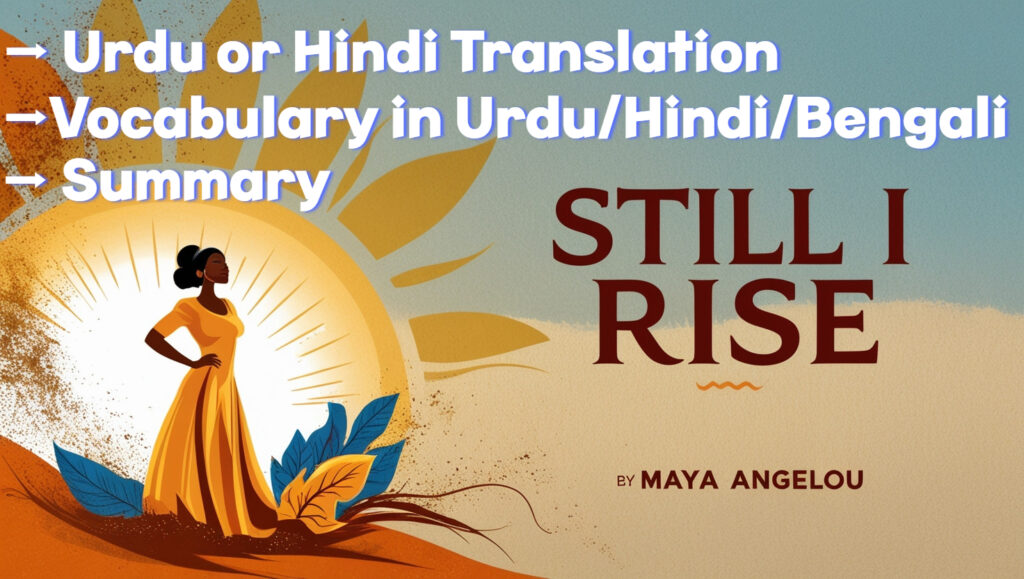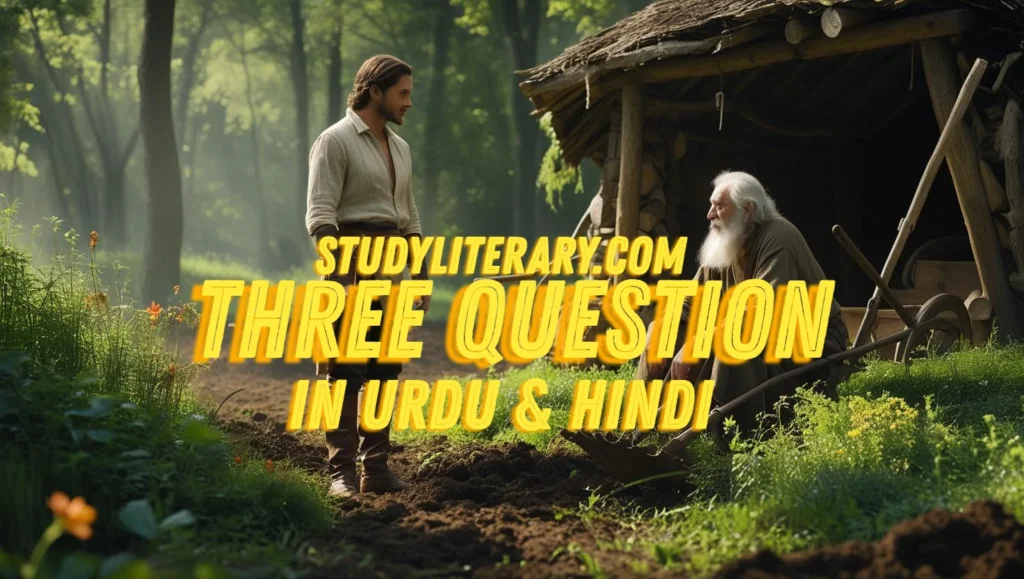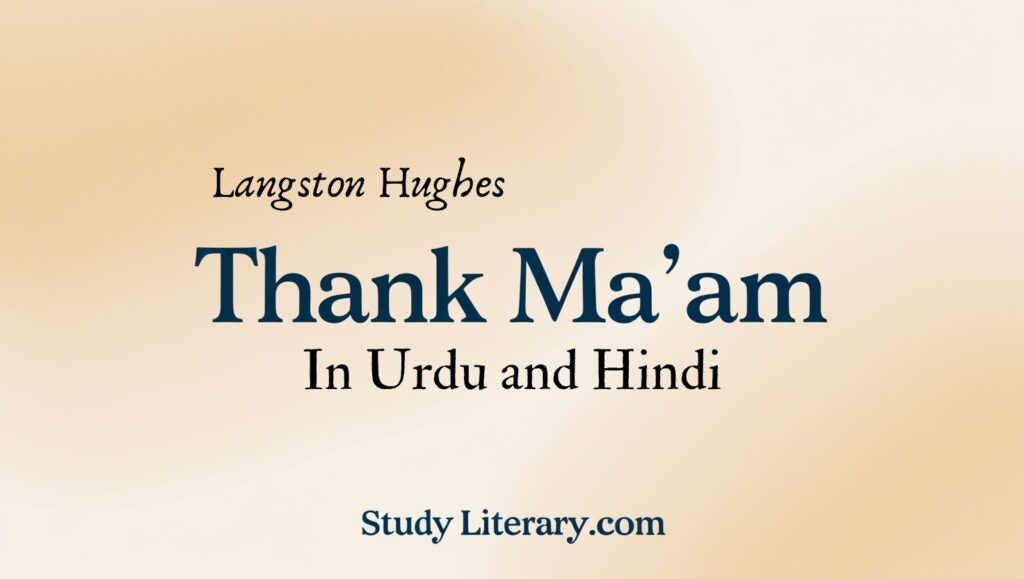
Still I Rise by Maya Angelou Urdu or Hindi Translation with Summary and Vocabulary
Still I Rise
MAYA ANGELOU
Stanza 1
You may write me down in history
Tum mujhe tareekh/itihaas mein likh sakte ho,
With your bitter, twisted lies,
Apni kadwi, tedhi jhooton ke saath,
You may trod me in the very dirt,
Tum mujhe mitti mein masal sakte ho,
But still, like dust, I’ll rise.
Magar phir bhi, dhool ki tarah, main uthoon gi.
Stanza 2
Does my sassiness upset you?
Kya meri khud-dari/aatm-sanyam tumhe tang karti hai?
Why are you beset with gloom?
Tum udasi mein kyun gire hue ho?
‘Cause I walk like I’ve got oil wells
Kyun ke main chalti hoon jaise mere ghar mein,
Pumping in my living room.
Tail ke kuan pump ho rahe ho.
Stanza 3
Just like moons and like suns,
Chand aur sooraj ki tarah,
With the certainty of tides,
Lehron ki paishgi/vishwas ke yaqeen ke saath,
Just like hopes springing high,
Jaise umeedain buland hoti hain,
Still I’ll rise.
Phir bhi, main uthoon gi.
Stanza 4
Did you want to see me broken?
Kya tum mujhe tootay hue dekhna chahte thay?
Bowed head and lowered eyes?
Jhuka hua sir aur nigahein/aankhen niche ki hui?
Shoulders falling down like teardrops,
Kandhay aansuon ki tarah girtay hue,
Weakened by my soulful cries?
Mere dard bharay cheekhon se kamzor?
Stanza 5
Does my haughtiness offend you?
Kya meri ghamand tumhe buri lagti hai?
Don’t you take it awful hard
Ise zayadah sanjeedgi/gambheerata se na len.
‘Cause I laugh like I’ve got gold mines
Kyun ke main hansti hoon jaise mere pas,
Diggin’ in my own backyard.
Apni zameen mein sona ke khadanain ho.
Stanza 6
You may shoot me with your words,
Tum apni baton/vicharon se mujhe maar sakte ho,
You may cut me with your eyes,
Apni nigaahon/nazro se mujhe kaat sakte ho,
You may kill me with your hatefulness,
Tum apni nafrat se mujhe qatal/maar kar sakte ho,
But still, like air, I’ll rise.
Magar phir bhi, hawa ki tarah, main uthoon gi.
Stanza 7
Does my sexiness upset you?
Kya meri jismani khubsurti tumhe tang karti hai?
Does it come as a surprise
Kya yeh tumhare liye chakit/hairani hai,
That I dance like I’ve got diamonds
Ke main is tarah naachti hoon jaise mere paas,
At the meeting of my thighs?
Heeron ka khazana hai mere janghon ke darmiyan?
Stanza 8
Out of the huts of history’s shame
Tareekh/Itihas ke sharam ki jhopriyon se nikal kar,
I rise
Main uthti hoon,
Up from a past that’s rooted in pain
Ek aise mazi/ateet se jo dard mein jada hua tha,
I rise
Main uthti hoon.
I’m a black ocean, leaping and wide,
Main ek siyah/kaala samundar hoon, jo uchhalta aur phailta jata hai,
Welling and swelling I bear in the tide.
Bilkul samandar ki lehron ki terha aubhr rahi hu aur taaqatwar ho rahi hu.
Stanza 9
Leaving behind nights of terror and fear
Dahshat aur khauf/bhay ke raaton ko peeche chhod kar,
I rise
Main uthti hoon,
Into a daybreak that’s wondrously clear
Aise subah ke ujale/savera mein jo shandar/uchh hai,
I rise
Main uthti hoon.
Bringing the gifts that my ancestors gave,
Woh upahaar/tohfe le kar jo mere purvaj ne diye,
I am the dream and the hope of the slave.
Main ghulam ke sapne aur aasha/umeed hoon.
Stanza 10
I rise
Main uthti hoon,
I rise
Main uthti hoon,
I rise.
Main uthti hoon.
Summary
This poem talks about being strong and not letting anything bring you down. The poet says that even if people lie about her, treat her badly, or try to make her feel small, she will still stand tall and rise above it all. She feels confident, walks proudly, and believes in herself, no matter what others think.
The poet asks if her confidence bothers people, but she doesn’t let their opinions stop her. She compares herself to the sun, moon, and tides, always rising and never giving up. Even if people try to hurt her with words, looks, or hate, she will keep rising like air.
She says she comes from a painful history, but she’s strong like an ocean, ready to move forward. Despite the fear and sadness of the past, she chooses to rise, bringing hope and dreams for the future. The poem ends with her saying again and again that she will rise, no matter what.
Main theme of the poem
The main theme of the poem “Still I Rise” is about being strong and not giving up, even when people try to bring you down. The poet talks about overcoming hate, lies, and unfair treatment with confidence and pride. No matter what happens, she continues to “rise” and stay strong, showing resilience and the power to keep going, no matter how tough things get.
Roman Urdu:
Is nazm ka ahem ma’zoon mazboot rehna aur kabhi haar na maan’na hai, chahe log tumhein neecha dikhane ki koshish karein. Shair apni nazm mein nafrat, jhoot aur na-insafi ka saamna pur-aitmaad aur fakhar ke saath karti hai. Jo bhi ho, woh hamesha “uthti” hai aur mazboot rehti hai, dikhati hai ke woh har mushkil ka saamna karte hue aage barhti rahegi.
Roman Hindi:
Is kavita ka mukhya vishay majboot rehna aur kabhi har na maanna hai, chahe log tumhe neecha dikhane ki koshish karein. Kavi apni kavita mein nafrat, jhoot aur anyaay ka saamna pur-confidence aur garv ke saath karti hai. Chahe kuch bhi ho, woh hamesha “uthti” hai aur majboot rehti hai, dikhati hai ki woh har mushkil ka saamna karte hue aage badhti rahegi.
Vocabulary of the text
| Word | Meaning in Urdu | Meaning in Hindi | Meaning in Bengali |
|---|---|---|---|
| History | تاریخ (Tareekh) | इतिहास (Itihas) | ইতিহাস (Itihash) |
| Bitter | کڑوی (Kadwi) | कड़वी (Kadvi) | তিক্ত (Tikto) |
| Twisted | مڑی ہوئی (Muri Hui), مڑی تڑی (Muri Tadi) | मुड़ी हुई (Mudi Hui), विकृत (Vikrit) | বিকৃত (Bikrito) |
| Lies | جھوٹ (Jhoot) | झूठ (Jhooth) | মিথ্যা (Mithya) |
| Dirt | مٹی (Mitti), گندگی (Gandagi) | मिट्टी (Mitti), गंदगी (Gandagi) | মাটি (Mati), ময়লা (Moila) |
| Dust | گرد (Gird), دھول (Dhool) | धूल (Dhool) | ধুলো (Dhulo) |
| Rise | اٹھنا (Uthna) | उठना (Uthna) | উঠা (Utha) |
| Sassiness | بے باکی (Be Baaki), تیز مزاجی (Taiz Mizaaji) | बेबाकी (Bebaaki), तीखापन (Teekhaapan) | বেয়াদবি (Beyadbi), ঠাট্টা (Thatta) |
| Upset | پریشان کرنا (Pareshan Karna) | परेशान करना (Pareshan Karna) | বিরক্ত করা (Birakt Kora) |
| Gloom | اداسی (Udaasi), مایوسی (Mayoosi) | उदासी (Udaasi), निराशा (Niraasha) | বিষণ্ণতা (Bishonnota), হতাশা (Hotasha) |
| Trod | روندنا (Rondna), پاؤں تلے مسلنا (Paon Talay Masalna) | कुचलना (Kuchalna), पैरों तले रौंदना (Pairon Tale Rondna) | পদদলিত করা (Poddolito Kora) |
| Moons | چاند (Chaand) | चाँद (Chaand) | চাঁদ (Chaand) |
| Suns | سورج (Sooraj) | सूरज (Sooraj) | সূর্য (Surjo) |
| Certainty | یقین (Yaqeen), وثوق (Wusooq) | निश्चितता (Nishchitata), विश्वास (Vishwas) | নিশ্চয়তা (Nishchoyota), আস্থা (Astha) |
| Tides | لہریں (Lehrain), موجیں (Mojen) | लहरें (Lehren), ज्वार (Jwaar) | জোয়ার (Jowar), ঢেউ (Dheu) |
| Hopes | امیدیں (Umeedein), آرزوئیں (Arzooein) | उम्मीदें (Umeedein), आशाएँ (Aashaen) | আশা (Asha), প্রত্যাশা (Protyasha) |
| Broken | ٹوٹا ہوا (Toota Hua), شکستہ (Shikasta) | टूटा हुआ (Toota Hua), बिखरा (Bikhra) | ভাঙা (Bhanga), ভগ্ন (Bhagna) |
| Bowed | جھکا ہوا (Jhuka Hua) | झुका हुआ (Jhuka Hua) | নত (Nota) |
| Lowered Eyes | جھکی ہوئی نظریں (Jhuki Hui Nazrein) | झुकी हुई नज़रें (Jhuki Hui Nazrein) | নিচু চোখ (Nicho Chokh) |
| Teardrops | آنسو (Aansoo), آنسو کے قطرے (Aansoo Ke Qatre) | आँसू की बूँदें (Aansoo Ki Boonden) | চোখের জল (Chokher Jol), অশ্রু (Oshru) |
| Soulful Cries | دلگرفتہ چیخیں (Dilgeer Cheekhain) | भावुक पुकार (Bhaavuk Pukaar), रोते स्वर (Rote Swar) | হৃদয়বিদারক কান্না (Hridoybidayak Kanna) |
| Haughtiness | گھمنڈ (Ghamand), غرور (Guroor) | घमंड (Ghamand), अहंकार (Ahankaar) | অহংকার (Ohongkar), দাম্ভিকতা (Dambhikota) |
| Offend | ناراض کرنا (Naraaz Karna), دل دکھانا (Dil Dukhana) | अपमानित करना (Apmanit Karna), चोट पहुँचाना (Chot Pahunchana) | অপমান করা (Opoman Kora), কষ্ট দেওয়া (Koshto Dewa) |
| Backyard | صحن (Sehan), پچھواڑا (Pechwara) | आँगन (Aangan), पिछवाड़ा (Pichwada) | উঠান (Uthan), পেছন দিক (Pechon Dik) |
| Shoot | گولی مارنا (Goli Maarna), فائر کرنا (Fire Karna) | गोली मारना (Goli Maarna), फायर करना (Fire Karna) | গুলি করা (Guli Kora), শুট করা (Shoot Kora) |
| Hatefulness | نفرت (Nafrat), عداوت (Adawat) | नफरत (Nafrat), घृणा (Ghrina) | ঘৃণা (Ghrina), বিদ্বেষ (Bidbesh) |
| Sexiness | جنسی کشش (Jinsi Kashish) | कामुकता (Kaamukta), यौन आकर्षण (Yaun Aakarshan) | যৌন আবেদন (Jouyon Abedan), যৌনতা (Jounota) |
| Surprise | حیرانی (Hairani), تعجب (Tajjub) | आश्चर्य (Ashcharya), चकित (Chakit) | অবাক (Obak), বিস্ময় (Bismoy) |
| Diamonds | ہیروں (Heeron) | हीरे (Heere) | হীরা (Hira) |
| Thighs | رانیں (Raanain), جیبھوں (Jibhon) | जाँघें (Jaanghein), ऊरू (Ooru) | উরু (Uru), উরুসন্ধি (Urusondhi) |
| Huts | جھونپڑیاں (Jhonpariyan), جھگیاں (Jhugiyan) | झोपड़ियाँ (Jhopadiyan), झुग्गियाँ (Jhugiyan) | কুঁড়েঘর (Kurighor), ঝুপড়ি (Jhupri) |
| Shame | شرم (Sharam), رسوائی (Ruswai) | शर्म (Sharm), अपमान (Apmaan) | লজ্জা (Lojja), অপমান (Opoman) |
| Pain | درد (Dard), تکلیف (Takleef) | दर्द (Dard), पीड़ा (Peeda) | ব্যথা (Byatha), যন্ত্রণা (Jontona) |
| Ocean | سمندر (Samundar) | महासागर (Mahasagar) | মহাসাগর (Mohashagor), সমুদ্র (Somudro) |
| Terror | دہشت (Dehshat), خوف (Khauf) | आतंक (Aatank), डर (Dar) | সন্ত্রাস (Shontrash), ভয় (Bhay) |
| Ancestors | اجداد (Ajdaad), پرکھوں (Purkhon) | पूर्वज (Purvaj), बुजुर्ग (Buzurg) | পূর্বপুরুষ (Purvopurush), আদি (Adi) |
| Slave | غلام (Ghulam) | गुलाम (Gulaam) | দাস (Das), ক্রীতদাস (Kritodash) |


